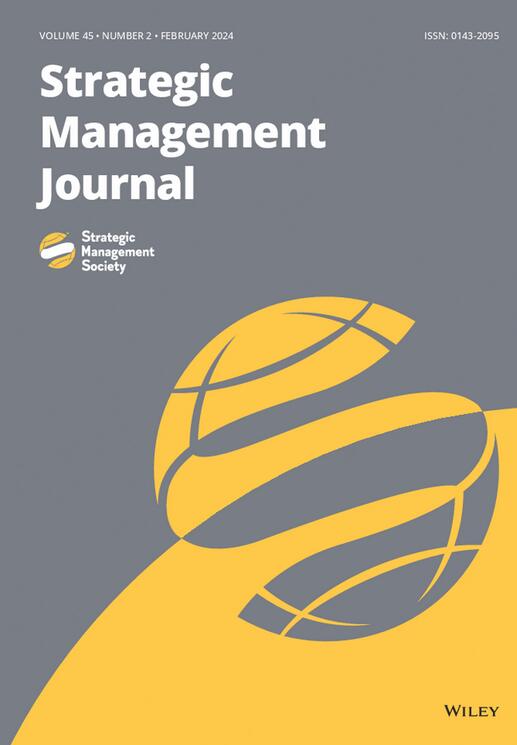Collider bias in strategy and management research: An illustration using women CEO's effect on other women's career outcomes
IF 7.2
1区 管理学
Q1 BUSINESS
引用次数: 0
Abstract
Research SummaryCollider bias can cause spurious correlations when researchers condition on a variable that is caused by—or shares a common cause with—both the outcome and the exposure variable. Despite its threat to inference, empirical research in strategy and management has largely overlooked the issue of collider bias. We distinguish colliders from other threats to identification and estimation and illustrate its importance with replications of published work suggesting that having a woman CEO reduces the career outcomes (compensation and representation) of other women executives. After accounting for collider bias, we find no evidence that women CEOs damage the career outcomes of other women in their organizations. We close by providing generalizable approaches to identify and mitigate the risk of collider bias in applied research.Managerial SummaryCollider bias is a type of statistical problem that can generate misleading results in empirical research. Although research in strategy and management has given substantial attention to other types of statistical problems, the issue of collider bias has not received sufficient scrutiny. We illustrate this point with replications of published work suggesting that having a woman CEO reduces the career outcomes of other women executives. After accounting for collider bias, we find no evidence that women CEOs damage the career outcomes of other women in their organizations. We provide advice for detecting and addressing collider bias in empirical research.战略与管理研究中的对撞机偏差:以女性首席执行官对其他女性职业成果的影响为例进行说明
研究摘要当研究人员对一个由结果和暴露变量共同引起或与之有共同原因的变量设定条件时,对撞机偏差可能会导致虚假相关性。尽管对撞偏差对推论构成威胁,但战略和管理方面的实证研究在很大程度上忽视了对撞偏差问题。我们将对撞偏差与其他对识别和估计的威胁区分开来,并通过对已发表的研究成果的复制来说明其重要性,这些研究成果表明,女性首席执行官会降低其他女性高管的职业成果(薪酬和代表性)。在考虑了对撞机偏差后,我们发现没有证据表明女性首席执行官会损害组织中其他女性的职业成果。最后,我们提供了在应用研究中识别和降低对撞机偏差风险的通用方法。管理总结对撞机偏差是一种统计问题,会在实证研究中产生误导性结果。尽管战略与管理研究对其他类型的统计问题给予了大量关注,但对撞机偏差问题却没有得到足够的重视。我们通过复制已发表的研究成果来说明这一点,这些研究成果表明,女性首席执行官会降低其他女性高管的职业发展成果。在考虑了碰撞偏差之后,我们没有发现任何证据表明女性首席执行官会损害组织中其他女性的职业发展。我们为在实证研究中发现和解决碰撞偏差提供了建议。
本文章由计算机程序翻译,如有差异,请以英文原文为准。
求助全文
约1分钟内获得全文
求助全文
来源期刊

Strategic Management Journal
Multiple-
CiteScore
13.70
自引率
8.40%
发文量
109
期刊介绍:
At the Strategic Management Journal, we are committed to publishing top-tier research that addresses key questions in the field of strategic management and captivates scholars in this area. Our publication welcomes manuscripts covering a wide range of topics, perspectives, and research methodologies. As a result, our editorial decisions truly embrace the diversity inherent in the field.
 求助内容:
求助内容: 应助结果提醒方式:
应助结果提醒方式:


